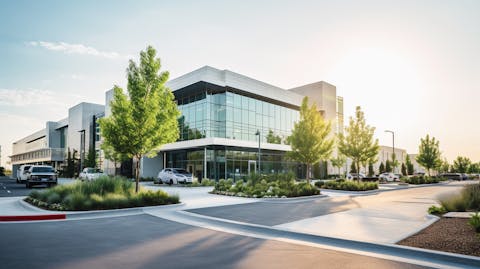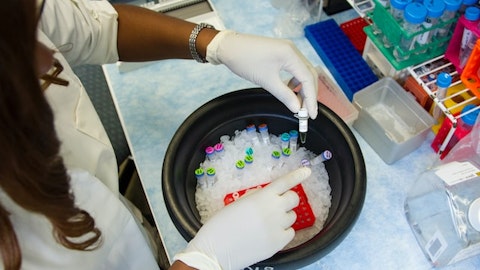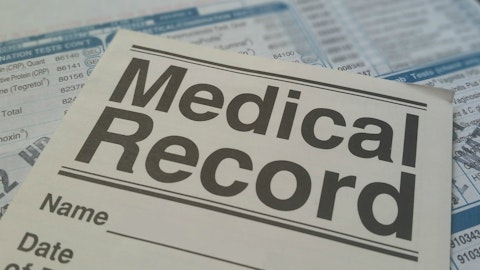Global Medical REIT Inc. (NYSE:GMRE) Q4 2023 Earnings Call Transcript February 28, 2024
Global Medical REIT Inc. isn’t one of the 30 most popular stocks among hedge funds at the end of the third quarter (see the details here).
Operator: Greetings, and welcome to the Global Medical REIT Fourth Quarter 2023 Earnings Call. [Operator Instructions]. As a reminder, this conference is being recorded. It is now my pleasure to introduce Steve Swett, Investor Relations. Thank you. You may begin.
Stephen Swett: Thank you. Good morning, everyone, and welcome to Global Medical REIT’s fourth quarter and full year 2023 earnings conference call. On the call today are Jeff Busch, Chief Executive Officer; Alfonzo Leon, Chief Investment Officer; and Bob Kiernan, Chief Financial Officer. Please note the use of forward-looking statements by the company on this conference call. Statements made on this call may include statements which are not historical facts and are considered forward-looking. The company intends these forward-looking statements to be covered by the Safe Harbor provisions for forward-looking statements contained in the Private Securities Litigation Reform Act of 1995 and is making the statement for purpose of complying with those Safe Harbor provisions.
Furthermore, actual results may differ materially from those described in the forward-looking statements and will be affected by a variety of risks and factors that are beyond the company’s control, including, without limitation, those contained in the company’s 10-K for the year ended December 31, 2022, and its other SEC filings. The company assumes no obligation to update publicly any forward-looking statements, whether as a result of new information, future events or otherwise. Additionally, on this call, the company may refer to certain non-GAAP financial measures such as funds from operations, adjusted funds from operations, EBITDAre and adjusted EBITDAre. You can find a tabular reconciliation of these non-GAAP financial measures to the most currently comparable GAAP numbers in the company’s earnings release and in filings with the SEC.
Additional information may be found on the Investor Relations page of the company’s website at www.globalmedicalreit.com. I would now like to turn the call over to Jeff Busch, Chief Executive Officer of Global Medical REIT. Jeff?
Jeffery Busch: Thank you, Steve. Good morning, and thank you for joining our fourth quarter and full year 2023 earnings call. Our high-quality medical real estate portfolio continues to produce steady results. At the end of the fourth quarter, portfolio occupancy was 96.5% with a weighted average lease term of 5.8 years. And the portfolio average rent coverage ratio of 4.2x. For the fourth quarter, reflecting impact of a loss on extinguishment of debt, we had a net loss attributable to common shareholders of $840,000 or $0.01 per share compared to net income attributable to common shareholders of $369,000 or $0.01 per share in the fourth quarter of 2022. FFO in the fourth quarter was $0.19 per share and unit, down $0.03 from the prior year quarter.
And our AFFO was $0.23 per share and unit, down $0.01 from the prior year quarter. In 2023, we patiently managed through continual difficult market conditions for acquisitions, and look to opportunistically dispose of assets to reduce our leverage and variable rate debt. We are pleased with the results of our dispositions activity in 2023 as we completed three dispositions at a weighted average cap rate of 6.3% that generated $80.5 million of gross proceeds. We use the net proceeds from these dispositions to pay down our variable rate debt, resulting in a leverage ratio at the end of the year of 43.6% to position the company for growth as accretive acquisition opportunities arise. I am proud of our team for efficiently executing these dispositions during the year.
Looking ahead to 2024, I’m excited to see the market for our target acquisitions has improved meaningfully compared to 2023. Significantly, we have a near-term acquisition pipeline of between $95 million and $110 million of medical properties that meet our investment criteria. As we look ahead, we continued our accretive growth strategy while maintaining or lowering our portfolio leverage. We believe the strategy of lower leverage growth is prudent in the current environment of sustained higher interest rates, and will lead to long-term growth for our stockholders. Overall, I am pleased with the results of 2023 and want to thank the entire team for their hard work and contributions to our results. With that, I turn the call over to Alfonzo to discuss our transaction activity and the current acquisition market conditions in more detail.
Alfonzo Leon: Thank you, Jeff. As Jeff mentioned, we are currently reviewing near-term acquisition opportunities, ranging from $95 million to $110 million that meet our investment criteria. Based on a typical timeline for our due diligence process, we’re targeting the second half of this year for closing these transactions. As acquisition cap rates have risen in response to buyers increased cost of capital, we are seeing sellers begin to adjust their expectations, which is leading to more accretive acquisition opportunities. We continue to remain actively involved with various physician groups, brokers and corporate sellers to identify acquisition opportunities. This continued dialogue along with our deleveraging activities in 2023 should allow us to capitalize on potential opportunities, which gives us an advantage over less liquid buyers.
Additionally, an unattractive debt refinancing market could push previously reluctant sellers our way as these sellers run out of refinancing options. We continue to closely monitor the ever changing market conditions and are excited about what we see for 2024 and beyond. We will continue to leverage our competitive advantage, including scale, access to capital and the potential utilization of OP unit deal structures to unlock opportunities. I’d now like to turn the call over to Bob to discuss our financial results. Bob?

Robert Kiernan: Thank you, Alfonzo. At the end of the fourth quarter 2023, our portfolio consisted of gross investments in real estate of $1.4 billion, including $4.7 million of total leasable square feet, 96.5% occupancy, 5.8 years of weighted average lease term, 4.2x rent coverage with 2.1% weighted average contractual rent escalations. In the fourth quarter, our total revenues decreased compared to last year to $33 million. Reduction in revenue is primarily driven by our property dispositions completed during the first 9 months of the year, as well as the recognition of reserves for approximately $1.1 million of rent related to our medical office building tenants in East Orange New Jersey, including approximately $0.2 million of deferred rent.
Our total expenses for the fourth quarter were $31.5 million, compared to $34.5 million in the prior year quarter. The decrease was primarily due to decreased interest expense and operating expenses. Our interest expense in the fourth quarter was $7 million, compared to $8.1 million in the comparable quarter of last year, reflecting the impact of lower average borrowings and lower interest rates compared to the prior year period. The beginning in early August, our credit facility pricing improved by 15 basis points as a result of our reduced leverage. In addition, in early August, certain of our forward starting interest rate swaps became effective, replacing maturity swaps, which reduced the interest cost and our $350 million term loan by 30 basis points compared to prior periods.
Our operating expenses for the fourth quarter were $6.1 million, compared to $7.1 million in the prior year quarter. But the decrease in these expense is primarily driven by the changes in our portfolio since the comparable prior year period. Note that real estate related taxes represents the largest component of our operating expenses. Regarding the fourth quarter expenses, $4 million related to net leases where the company recognized a comparable amount of expense recovery revenue, a $1.4 million related to gross leases. G&A expenses for the fourth quarter of 2023 were $4.2 million, compared to $4.1 million in the fourth quarter of 2022. Within our current quarter G&A expenses, note that our stock compensation costs were $1.2 million in the quarter and our cash G&A costs were $3 million.
Looking ahead, we expect our G&A expenses in 2024 to increase to be in the range of $4.4 million and $4.6 million on a quarterly basis. During the fourth quarter, we completed the defeasance of a CMBS loan by making a total payment of $31.5 million, including transaction costs. The net carrying value of the loan was $30.6 million on the date of defeasance, resulting in a loss on extinguishment of debt of $868,000. In connection with the defeasance, we subsequently received $8.4 million in escrowed funds held by the CMBS servicer and used those funds to reduce our total debt and leverage. Net loss attributable to common stockholders for the fourth quarter was $840,000 or $0.01 per share, compared to net income attributable to common stockholders of $369,000, or $0.01 per share in the fourth quarter of 2022.
FFO in the fourth quarter was $13.3 million or $0.19 per share in unit compared to $15.5 million, or $0.22 per share and unit in the fourth quarter of 2022. AFFO in the fourth quarter was $15.9 million, or $0.23 per share and unit compared to $16.5 million, or $0.24 per share and unit in the fourth quarter of 2022. Moving on to the balance sheet. As of December 31, 2023, our gross investment in real estate was $1.4 billion, which is down about $60 million from the start of the year reflecting our disposition activity. At December 31, 2023, we had $618 million of total gross debt with the weighted average remaining term of 2.9 years. At quarter end, 85% of our total debt was fixed rate debt, our leverage ratio was 43.6% and our weighted average interest rate was 3.83%.
As previously mentioned, with our reduced leverage ratio, during the third quarter, we lowered the SOFR margins in our credit facility by 15 basis points. SOFR margin on our revolver now at 1.35% and our term loan margins are now 1.30%. Lastly, the current unutilized borrowing capacity under the credit facility is $294 million. We did not issue any shares of common stock under our ATM program during the quarter or to date in the first quarter of this year. With respect to our 2023 lease expiration, we ended the year retaining 78% of the full years 363,000 expiring square feet and 85% of the related expiring ABR. Our outlook regarding 2024 lease expirations is very good, and in general consistent with our experience on 2023 lease expirations.
Currently, we are expecting that our occupancy during 2024 will range between 95% and 96.5%. Regarding capital expenditures on the portfolio, in 2023, our cash spend was approximately $9.6 million. Currently, we’re projecting 2024 capital expenditures of approximately $10 million to $11 million related to building and site improvements, and approximately $2 million to $3 million in tenant improvements, primarily associated with lease renewals and lease up to be completed during 2024. As we begin the year, we are confident that our resilient portfolio and ample liquidity available to us continue to help us navigate these challenging market conditions. We are optimistic about moving forward in our acquisition efforts in 2024 and look forward to sharing our progress with you throughout the year.
This concludes our prepared remarks. Operator, please open the call for questions.
Operator: [Operator Instructions] Our first question comes from the line of Austin Wurschmidt with KeyBanc. Please proceed with your question.
See also 14 Social Security Spousal Benefits and Loopholes You Need to Know and 15 States That Don’t Tax Retirement Pension Payouts.
Q&A Session
Follow Chiron Real Estate Inc. (NYSE:XRN)
Follow Chiron Real Estate Inc. (NYSE:XRN)
Receive real-time insider trading and news alerts
Austin Wurschmidt: Hey, good morning, guys. Jeff, you highlighted accretive investment opportunities several times throughout your prepared remarks and then kind of hit on the importance of keeping leverage in check in the current environment. I mean, how are you thinking about the economics of these deals and maybe some additional specifics around plans to finance the transactions?
Jeffery Busch: Oh, absolutely. We have basically a optimistic plan, which is basically the Fed lowers the rates. These are purchase agreements that we don’t have to close for quite a while out there. There’s real opportunities for us in the market. So one or two things can happen. One is we get a lowering of the rates where you could always see it’s happened 3x, that when the market felt the rates were lowering, we moved into 1,150 to $12 type of stock. And that’s an opportunistic to use equity and lower it. On the other hand, like we showed last year, we have assets that will sell in the low six caps. And the acquisitions we’re looking at, are around eight caps, triple net and others. So we basically could do either one or two things, trade our six caps of other types of facilities, and buy these eight caps and sort of bring up, make the spread, or my preference would be if the market conditions are right, that we go out and we do a combination of equity and debt.
And with the equity and debt, we — our new criteria is to keep lowering, to be accretive, but also to lower our debt, eventually below 40%. I mean, it will take a while. But our goal is to lower before 40.
Austin Wurschmidt: And I think, Alfonzo you mentioned, OP units potentially, I guess how willing are buyers to take OP units, and maybe how much can that limit the equity need that you’ll need to move forward with these deals?
Alfonzo Leon: It’s hard to predict. I mean, we always try to offer it and discuss and try to stimulate that interest. But it’s very idiosyncratic, and really, it’s an estate planning decision that the seller has to have and it’s pretty hard to predict. And we had one last year, and we had — in 2018 we had a lot of success with that. But it’s hard to predict.
Austin Wurschmidt: And then just lastly, for me, I guess, can you provide some additional details or specifics on sort of the types of deals? I mean, these are just all straight MOB transactions, anything unique about them? Are the lease opportunities more stabilized? Just any detail you can provide would be appreciated. Thanks.
Alfonzo Leon: Yes, sure. We’re — our focus is more MOBs and surgery centers. And we’re also trying to pursue opportunities that are more single tenant in nature versus multi tenant.
Operator: Our next question comes from the line of Robert Stevenson with Janney Montgomery Scott. Please proceed with your question.
Robert Stevenson: Good morning, guys. Bob, revenues were down $2.6 million quarter-over-quarter, operating expenses were down $1.1 million and sort of below where it’s been over the last few. Is that due to that reimbursements timing thing that you were talking about? Or is there something else going on there that we need to be aware of?
Robert Kiernan: Hi, Rob. The big driver for the decrease overall was the disposition activity, number one, but then number two, unique to the fourth quarter was the fact that we put on reserves for $1.1 million, that was a reduction of revenue for the quarter. And that was related to a property we mentioned in the release in East Orange, New Jersey, and just some color on that is that, that’s a property that we bought in September of 2016. So we’ve owned it for a while. And until this recent event, you hadn’t had any significant issues with the property that the tenant there is prospect medical, and while we were working closely with them and keeping us informed of their cash flow issues that they were facing, we concluded that that was the most appropriate accounting.
So that’s the reduction. That’s in the fourth quarter. But with that said, relative to this location, and this tenant, we think that in the longer term that we’ll work through the issues with the property, b oth in terms of payments from prospect and relative to our establishing new tenants at the facility.
Robert Stevenson: Okay. And then I guess, on that, I mean, how’s — beyond that tenant, how extensive is the watch list? And is anybody else on cash accruals at this point versus accruals at this point?
Robert Kiernan: No, no one else at this point.
Robert Stevenson: Okay. So — and then Alfonzo, how are you looking at the — these assets that you — that you’re focused on acquiring under purchase agreements, as well as everything else that’s out there today. I mean, is there much availability of debt financing? How broad is the market for these assets? I mean, are you guys one of the only players in town? Or is the — are local guys able to get financing to be competitive on these type of transactions?
Alfonzo Leon: So that — what we’re doing is really trying to take advantage, and we always try to position ourselves to play to our strengths and find opportunities that leverage the resources we have. And so right now our credit facility is a competitive advantage. And so the opportunities that we are looking at is ones where we can use the efficiency and the certainty of close of our balance sheet, and trying to get deals that make sense for us that are accretive. So it’s — each case is unique. But we are trying to position ourselves to use the advantages that we have to get deals that are attractive to us.
Robert Stevenson: Okay. That’s helpful, guys. Thank you for the time.
Operator: Our next question comes from the line of Bryan Maher with B. Riley. Please proceed with your question.
Bryan Maher: Thank you and good morning. Maybe for Bob …
Jeffery Busch: Good morning.
Bryan Maher: … just give us a little bit more color on this defeasance that you referred to a couple of times, kind of how that played out in layman’s terms?
Robert Kiernan: Oh, sure. Sure, Bryan. So the CMBS, it’s a $30 million CMBS roughly, that we have put on in 2016. And so kind of predates the IPO of the company, but it had been causing us a lot of cash management issues as well as administrative issues. And more and more cash was getting tied up with the service, or we saw an opportunity to extinguish the debt and free up the cash that was being held by the servicer. And so we were able to eliminate both the administrative burden and reduce that kind of current and prospective kind of cash management issue that we’re dealing with there to free up the — to free up that cash. And so ultimately, we defeasance the $31 million CMBS. But end up with 7-ish million back that we can reduce our overall debt.
So through the transaction, we’re able to reduce our overall debt and leverage. So that was really the kind of the element of it that was kind of the successful element of it to reduce debt and leverage from an overall perspective.
Bryan Maher: Right. But were there any properties involved here? I mean, did you just basically buy out a property that had CMBS against it with your credit facility or something?
Robert Kiernan: Right. We refinance it through the credit facilities. And so again, this debt had probably had five, six of our original properties from 2016 vintage in the facility. And so those assets were attributable to the CMBS. And again, what the CMBS does is limit your ability relative to those assets, even at simple things such as maintenance can be burdensome with the CMBS, or things you want to change with the property can be burdensome with the CMBS. And so the idea was to — and then also, again, let alone the cash element of the amount of cash that was being held by the servicer. So refinancing it through the revolver then frees us up with the ability to have, again, more flexibility relative to those properties.
Bryan Maher: Got it. That’s super helpful. On the CapEx side, you said $10 million to $11 million for 2024 and then you made a comment about $2 million to $3 million in tenant improvements. Is the $2 million to $3 million in the $10 million to $11 million, or is an addition to $10 million to $11 million?
Robert Kiernan: It’s in addition, but it’s harder to predict the timing. So I think that that’s kind of why I bucketed them differently, because it can be harder to predict the timing, and how that will flow. And often we’ll see again, it can be delayed, it may not fall in the same exact the timeframes that you’re looking at. So I just wanted to break that second piece out.
Bryan Maher: Okay. That’s helpful. And maybe just last for, Alfonzo. I think in your prepared comments, you talked about back half loaded for acquisitions. So to be clear, you’re not expecting anything really in 1Q and 2Q. And can you give us maybe some range or level of magnitude of what you think might happen in the second half?
Alfonzo Leon: Yes, so correct, nothing in 1Q and nothing to 2Q. And what we provided is a range and what we’re trying to do is have that be more towards the end of the year than in Q3 that we’re trying to weigh that more on Q4.
Bryan Maher: Okay, thank you.
Operator: Our next question comes from the line of Alec Feygin with Robert W. Baird. Please proceed with your question.
Alec Feygin: Hey, good morning, guys.
Jeffery Busch: Good morning.
Alec Feygin: First one is on the investment pipeline. What are the yields that GMRE is securing? And is the pipeline made up of any portfolios today? Or is it all single assets?
Alfonzo Leon: Yes. So we are targeting yields that are approximately 8%. And yes, these — we are targeting portfolios that right now are difficult to finance and trying to take advantage of the fact that we have our credit facility to complete those transactions.
Alec Feygin: Got it. That’s helpful. And — so could you speak on the efforts for leasing the space that is expiring this year? Kind of what’s been the historic retention rate for the portfolio and for any tenants who may have already notified you that they’re not re-signing, how has the demand been for that current space?
Robert Kiernan: Yes. So for our 2024 expirations, we mentioned on the call and we did in the script that we — from a retention last year, we were just under 80% on a square feet basis, in the mid 80s on an ABR basis. And right now, I think we’re largely tracking in that same vicinity. So call it, you use 80% as — maybe as a proxy on both numbers is how we are looking at it here in late February.
Alec Feygin: Thank you. And on the demand for the space that you already know that’s not going to be resigned, how is that looking like?
Robert Kiernan: I mean we — I mean, it’s like anything, we are actively working it to try to, again, keep our occupancy as high as we can and just incent ourselves to move the — to keep the space as fully occupied and leased up as possible. So it’s a very active process that the whole team is engaged in.
Alec Feygin: Got it. Thank you. That’s all for me.
Operator: There are no further questions in the queue. I’d like to hand the call back to management for closing remarks.
Jeffery Busch: I’d like to thank everybody for attending our meeting. Have a good year. Take care.
Operator: Ladies and gentlemen, this does conclude today’s teleconference. Thank you for your participation. You may disconnect your lines at this time, and have a wonderful day.
Follow Chiron Real Estate Inc. (NYSE:XRN)
Follow Chiron Real Estate Inc. (NYSE:XRN)
Receive real-time insider trading and news alerts




